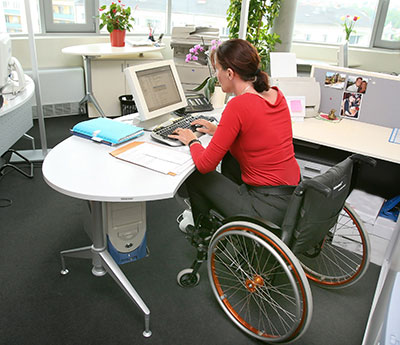7 Tips for Navigating Vocational Rehabilitation
Vocational rehabilitation is a process which enables persons with functional, psychological, developmental, cognitive and emotional impairments or health disabilities to overcome barriers to accessing, maintaining or returning to employment or other useful occupation.

The Arizona Vocational Rehabilitation (VR) program within the Department of Economic Security's (DES) Rehabilitation Services Administration (RSA), dedicates itself to helping Arizonans with disabilities achieve self-sufficiency through sustainable and fulfilling employment.
Getting the Most out of Your VR Services
VR counselors are trained to serve persons who are blind, visually impaired, deaf/hard of hearing, transition youth (specific contracted high school programs), persons with brain and spinal cord injuries, and individuals with behavioral health disabilities.
VR counselors offer a unique and flexible approach to serving clients by offering specialized equipment, education, and training opportunities, as needed, to prepare each client to enter the workforce.
To ensure that clients get the most out of the VR program, RSA professionals offer the following tips:
- Get the Scoop:
Do your research before seeking VR services to make sure the program is right for you.
Attend an information session at a VR office near you. Sessions are typically offered on a monthly basis in a group setting, but are also available through one-on-one meetings if requested.
Watch the " Vocational Rehabilitation Informational Video" on YouTube.
Read about the VR program on the DES website.
Ask questions! VR staff are available to answer any program-related questions you might have, so don't be shy. You can reach someone from the VR team by calling Toll-Free 1-800-563-1221 during normal business hours.
- Be an Open Book:
Your VR counselor will need documentation of your disability before he/she can begin services. Bring any medical records, such as an assessment or evaluation, to verify your disability. If you have a Benefits Award Letter, bring that, too.

A State I.D or Driver's License and Social Security card are also needed.
Share information about any education and work history you have under your belt. This experience can be used to help you achieve your career goals.
- Put in the Work:
As a VR client, you will be an equal partner on your case. Your counselor will want to get you working as soon as possible, so be sure you are ready to take the steps needed to reach your career goals. You may be required to bring in additional paperwork, come in for assessments, go to training, etc. These things can take time, so be patient and stay in touch with your counselor to keep him/her abreast of your progress.
- Be Punctual:
Try your best to be on time to appointments so you can spend as much time as possible with your counselor. If you are running late or need to cancel an appointment, please inform your counselor as soon as possible.
- Keep in Touch:
It's important that you have regular contact with your VR counselor. Reach out at least once a month to check-in.
Do not ignore phone calls, e-mails, voicemails or letters from RSA/VR. A lack of response can delay services or result in your case getting closed.
If you change your mind about participating in the VR program, please inform your counselor right away - he/she won't take it personally.
- Dream Big:
Before coming in for services, begin thinking of what you might like to do as a career. Consider your interests and passions. Having a career goal in mind can expedite your services.
Not sure what you want to do? No problem. VR counselors are trained to help you identify a fulfilling career that would be best for you.
- Be Flexible:
Some of the training and assessments might push you outside of your comfort zone, but they are designed to get you on the most fulfilling path as possible. Don't expect to receive the same services as someone else. Plans are individualized to the person based on his/her employment goals and disability-related needs.
For more information about the DES VR program, please visit our Rehabilitation Services page.
By Jillian Seamans

